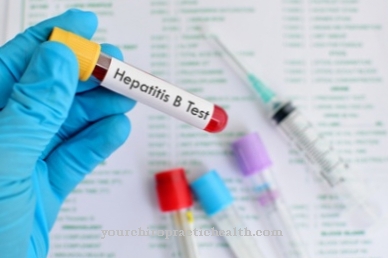Caspofungin refers to a special antifungal agent that is used to effectively treat severe fungal diseases. These include various aspergillosis and candidiasis. Caspofungin is usually given intravenously.
What is caspofungin?

The drug caspofungin has been available in Germany since July 2002 and is used to treat invasive fungal diseases. In most cases, the diseases to be treated are aspergillosis and candidiasis.
The active ingredient is very well tolerated and can also be used if there is already resistance to various antimycotics.
When treated with caspofungin, patients usually suffer from opportunistic infections that occur with a damaged immune system. These are often based on diseases such as AIDS or malignant tumors. The drug is also used in patients who suffer from immunosuppression. These often occur after organ transplants.
However, a large number of pathogenic fungi can attack the human body even with a healthy immune system and cause a wide variety of complaints.
Pharmacological effect
The antifungal agent caspofungin is highly effective overall. All types of fungi that colonize humans have cell walls made up of polysaccharides and chitin. The enzyme glucan contained in it is inhibited in its function by the administration of caspofungin. Fungi rely on this enzyme to build their cells. Human cells, on the other hand, do not have these cell walls and the enzymes they contain.
The effectiveness of caspofungin is particularly evident in the rapid decrease in symptoms. This occurs on the first day of intravenous therapy. Ultimately, the symptoms of the disease completely disappear and the patient is symptom-free.
Studies have shown that the success rate in treating patients with various mycoses (fungal infections) is over 80 percent. Thus, the effectiveness of the drug can already be rated higher than with various other antimycotics.
Caspofungin is particularly well tolerated because the drug works in a targeted manner and hardly puts any strain on the organs of the human body. Not least because of this, caspofungin is one of the most frequently used antimycotics worldwide in clinical therapy.
Medical application & use
Most of the serious fungal diseases that are treated in hospitals are based on colonization with so-called Candida fungi. Mycoses represent a major health risk, especially for patients with a weakened immune system or those who have to undergo chemotherapy. Life-threatening complications can increasingly occur in connection with a fungal infection and automatically mean a high risk for the patient. One of these risks is the so-called haematogenic spread. In view of this, a rapid and prophylactic administration of caspofungin is appropriate.
Even when a higher dosage of the active ingredient is required, the drug is usually well tolerated. The targeted effectiveness is thus given even if complications occur.
Caspofungin has been granted treatment approval for severe invasive aspergillosis. Here the patients usually do not respond to other medications or the tolerance is insufficient.
Various studies have also shown that various Candida fungi are becoming more and more resistant to resistance, which can lead to a major problem. It has been shown here that the drug caspofungin, in its entire mode of action and nature, withstands the formation of resistance (so far) and also has a high clinical effectiveness. The good tolerability also contributes to the fact that treatment discontinuations are less common overall.
Risks & side effects
The drug caspofungin is tolerated very well by the majority of patients with the relevant fungal diseases. Side effects and risks hardly occur. However, in some cases with intravenous administration at the local site, phlebitis can occur, which, however, can be treated without problems. Furthermore, itching, pain and burning sensations at the injection site may occur during therapy with caspofungin. Overall, however, these side effects rarely occur.
Risks and complications in connection with the administration of caspofungin are also hardly to be expected. The therapy can be carried out in a targeted manner and to the end, interruptions are only necessary in very few cases.





.jpg)





















